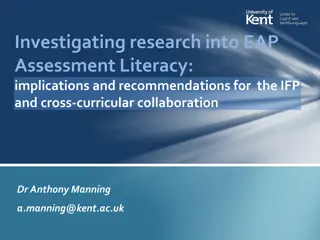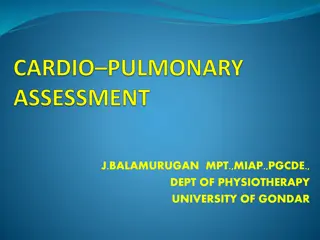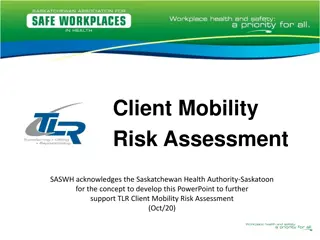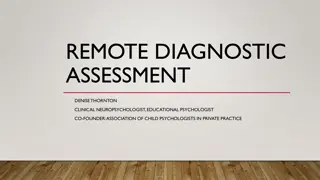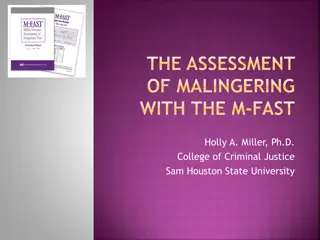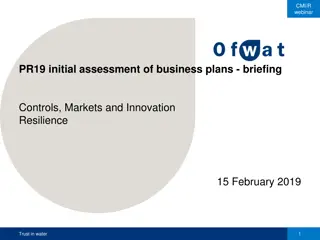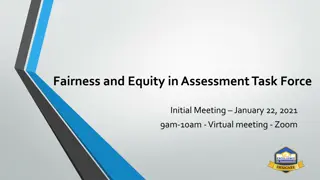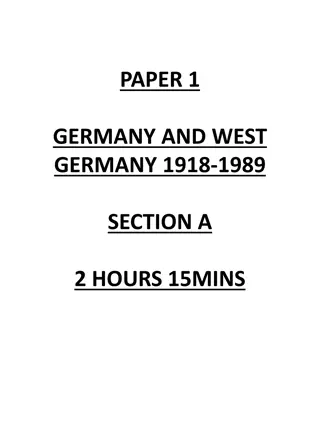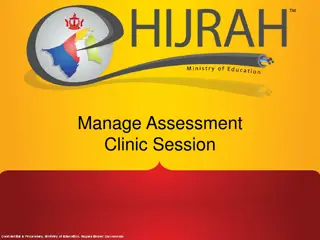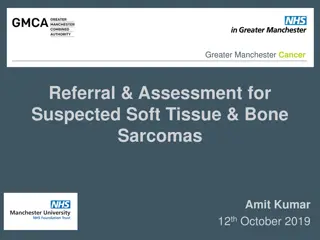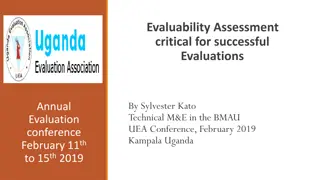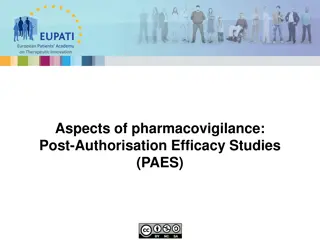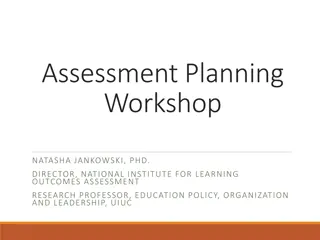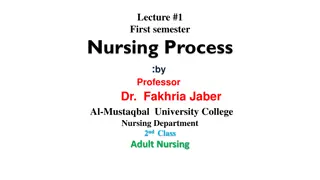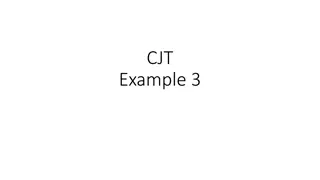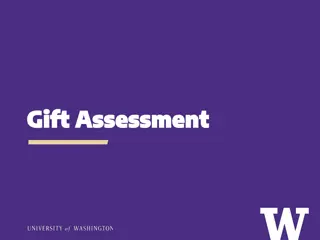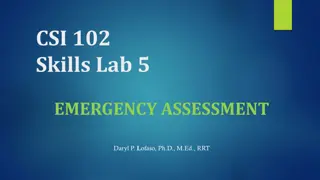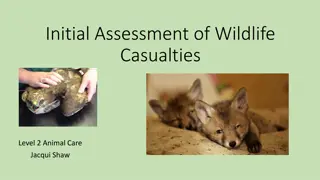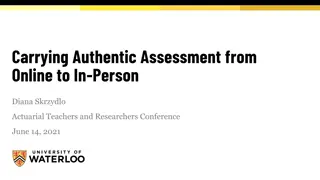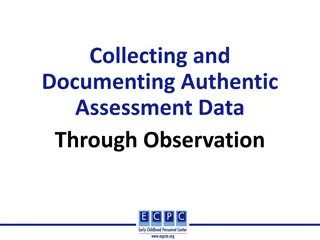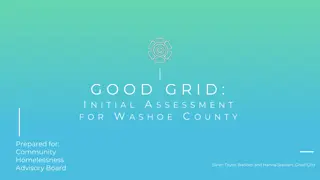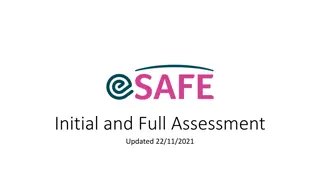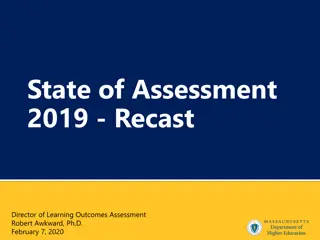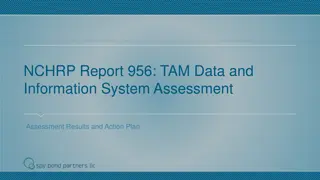Sheffield Early Help Assessment Form Update and Integration with Extended Support Plan
Sheffield has introduced an updated Early Help Assessment form to streamline the assessment process within the Early Help System. This new form combines the Early Help Assessment with the Extended Support Plan, aligning various assessment tools and referral forms into one comprehensive document. The
5 views • 22 slides
Enhancing Language Learning Through Peer Assessment
Explore the benefits of peer assessment as a valuable tool for language learning, comparing it with self-assessment. Discover the components and challenges of self-assessment, along with the potential of peer assessment to improve accuracy and promote self-regulation. Gain insights into what peer as
3 views • 29 slides
Investigating EAP Assessment Literacy for IFP and Cross-Curricular Collaboration
This research project by Dr. Anthony Manning explores the implications and recommendations regarding EAP assessment literacy for the International Foundation Program (IFP) and cross-curricular collaboration. The study delves into defining assessment literacy, research objectives, relevant literature
3 views • 26 slides
Overview of DSW End Point Assessment Team Leader Level 3
DSW End Point Assessment Team Leader Level 3 provides a clear understanding of the assessment process, ensuring individuals comprehend why and when it occurs, responsibilities involved, and how DSW supports them. It covers topics such as what End Point Assessment entails, assessment design and deliv
1 views • 18 slides
Comprehensive Overview of Problem-Oriented Medical System in Physiotherapy Assessment
In the realm of physiotherapy assessment, the Problem-Oriented Medical System (POMS) plays a vital role in accurately defining patient problems, creating treatment plans, and monitoring progress. This system, pioneered by Weed in 1968, consists of Problem-Oriented Medical Records (POMR), auditing, a
2 views • 34 slides
Mobility Risk Assessment Process in Client Care
The Mobility Risk Assessment Process in Client Care involves conducting initial assessments to determine baseline mobility, identifying risks, selecting appropriate moving techniques, and effectively communicating and evaluating risks throughout care. The assessment considers communication status, p
1 views • 31 slides
Remote Diagnostic Assessment Explained by Clinical Neuropsychologist
Remote diagnostic assessment, also known as telepractice, allows assessors and individuals to be in separate locations while using internet-connected devices for assessment sessions. A facilitator may be present for support, and precautions are taken to ensure confidentiality and integrity of the as
3 views • 13 slides
Understanding Malingering: Assessment and Implications
Malingering, intentional fabrication of symptoms for external gain, presents challenges in assessment. The M-FAST (Miller Forensic Assessment of Symptoms Test) offers a detailed approach for identifying malingering behaviors. Research suggests relying solely on clinical judgment may lead to inaccura
5 views • 24 slides
Initial Assessment of Business Plans for Water Sector Development
This briefing outlines the key areas covered in the initial assessment of business plans for the water sector, focusing on Controls, Markets, Innovation, Resilience, and Trust. The webinar discusses the objectives, actions required from companies to meet quality standards, and the importance of addr
0 views • 31 slides
Fairness and Equity in Assessment Task Force Meeting Overview
The Fairness and Equity in Assessment Task Force is committed to establishing guidelines to ensure fairness in assessment processes at the University of Florida. The task force members are tasked with developing models and guidelines for faculty and staff to promote equitable assessment practices. R
1 views • 29 slides
Lancashire Assessment and Planning Framework: Enhancing Child Welfare Through Comprehensive Assessments
The Lancashire Assessment and Planning Framework outlines the approach for assessing and managing child welfare cases in Lancashire. It emphasizes the importance of effective assessment, planning, and interventions to meet the needs of children and families. The framework integrates tools like the C
0 views • 13 slides
Understanding Assessment in Medical Education
Exploring the concepts of assessment in medical education, including defining assessment, types of assessment, reliability, validity, and aligning assessment methods with intended learning outcomes. The importance of constructive alignment and the impact of assessment on learning outcomes are also d
1 views • 12 slides
Germany and West Germany 1918-1989: Paper 1 Assessment Overview
This content provides information about the Paper 1 assessment on Germany and West Germany from 1918 to 1989. It includes question types, assessment structure, marking schemes, and aims to help students understand the focus areas and concepts of the assessment. The assessment covers political, socia
7 views • 54 slides
Effective School Assessment Setup Strategies
Explore how to manage assessment clinic sessions, address special cases in school assessment setups, handle student assessment marks in different scenarios like transfers, absences, and more. Learn about entering assessments for absent students, conducting result slip generation, and using assessmen
0 views • 19 slides
Assessment Matters in Sociology: Enhancing Learning Through Evaluation
Explore the significance of assessment in sociology education, focusing on key questions to evaluate current assessment procedures, review individual course assessments, and develop strategies to enhance student learning outcomes. Delve into the centrality of assessment in the learning process, with
1 views • 15 slides
Understanding Greater Manchester Cancer: Referral, Assessment & Management for Suspected Sarcomas
This content provides comprehensive information on Greater Manchester Cancer referral and assessment for suspected soft tissue and bone sarcomas. It covers objectives, background, symptoms, signs, clinical assessment, initial management, and referral criteria. Essential guidelines and key points on
0 views • 26 slides
Understanding Evaluability Assessment in Program Evaluation
Evaluability Assessment is a critical pre-evaluation appraisal to determine if a program's performance can be evaluated. It assesses the program logic, implementation status, and feasibility for conducting rigorous evaluations. Loss of evaluability can occur due to various factors, as highlighted in
0 views • 12 slides
European Patients Academy on Therapeutic Innovation: Post-Authorisation Efficacy Studies (PAES)
The European Patients Academy on Therapeutic Innovation focuses on PAES to address important questions about medicine efficacy post-authorization. Regulators may request such studies to resolve concerns and ensure the initial evidence for marketing authorization is upheld. PAES can be triggered by N
5 views • 6 slides
Insights into Managing Assessment in the Classroom by Assessment Research Group
Explore the importance of standards and assessment in education through the lens of the Assessment Research Group. Gain valuable perspectives on curriculum delivery, understanding the assessment system, learner assumptions, task parameters, and more. Discover how language, structure, and agency play
2 views • 25 slides
Workshop on Assessment Planning by Dr. Natasha Jankowski
Dr. Natasha Jankowski, Director of the National Institute for Learning Outcomes Assessment, conducts a workshop focusing on effective use of assessment data to enhance undergraduate education. The workshop covers areas like evaluating assessment plans, program learning outcomes, and assessment rubri
0 views • 30 slides
Enhancing Understanding through Assessment in Educational Design Workshop
Learn and collaborate on assessment practices in education design at the "Understanding by Design Assessment Focus" workshop. The agenda includes sessions on summative and formative assessment, feedback, reporting, and more. Engage in activities like generating questions, finding destination partner
1 views • 76 slides
Nursing Process Overview: Assessment to Data Collection
The nursing process is a systematic problem-solving approach to meet healthcare needs. The key components include assessment, diagnosis, planning, implementation, and evaluation. The initial step is assessment, gathering data through various methods. Different types of assessments such as data-based
0 views • 32 slides
Comprehensive Assessment in ACT: A Transdisciplinary Approach
Comprehensive Assessment in Assertive Community Treatment (ACT) involves a transdisciplinary team conducting detailed evaluations to develop unified service plans. Participants are actively engaged in all stages of planning and delivery, with team members and participants collaboratively developing
0 views • 18 slides
Institutional Assessment Planning Workshop Feedback and Insights
Feedback and insights from a recent institutional assessment planning workshop led by Dr. Mark Nicholas at FSU S. Warren Conference Center & Inn. Participants provided feedback on the usefulness of the content, presenter knowledge, ability to develop assessment plans, post-training assessment knowle
1 views • 9 slides
Clinical Judgement Test: Neonatal Foal Case Presentation and Assessment
This case involves a clinical judgement test scenario of an 8-hour-old Standardbred colt foal presenting with recumbency, weakness, and abnormal blood parameters. The foal's history suggests possible placental insufficiency and dysmaturity, leading to pulmonary dysfunction and other complications. I
0 views • 14 slides
Understanding Higher Education Assessment: The Complete Guide
Higher education assessment involves a systematic process of collecting, reviewing, and utilizing information to improve student learning and development. This guide covers the assessment cycle, learning outcomes, the mission behind assessment in higher education, what assessment is and is not, reas
1 views • 36 slides
Understanding Gift Assessment Process at University of Washington
The Gift Assessment Process at University of Washington involves applying a 5% assessment to select current-use gifts over $1,000 and under $5 million. This assessment supports the university's advancement efforts and institutional priorities by transferring 5% of eligible contributions to the Provo
1 views • 5 slides
Overview of Environmental Impact Assessment and Strategic Environmental Assessment Directives
Environmental Impact Assessment (EIA) and Strategic Environmental Assessment (SEA) play crucial roles in evaluating the impact of planned activities on the environment. This content delves into the concept, origins, development, and key elements of environmental assessment, discussing the legal fram
2 views • 35 slides
Institutional Assessment and Effectiveness Workshop Achievements at SUNY Oneonta
The Office of Institutional Assessment and Effectiveness at SUNY Oneonta has made significant progress in developing assessment protocols and processes, leading to a culture of assessment. This includes completing planning and assessment cycles, establishing objectives and procedures, and aligning u
1 views • 16 slides
Emergency Assessment Guide for Medical Professionals
Comprehensive emergency assessment guide covering primary and secondary assessments, triage classification, and differentiation of emergent, urgent, and non-urgent medical conditions. Includes initial assessment steps, Glasgow Coma Scale evaluation, and key interventions for life-threatening situati
0 views • 17 slides
Oregon Department of Education Assessment and Accountability Resources
Access important information on assessments, accountability, and reporting from the Oregon Department of Education. Find resources on updating assessment records, accessing student scores, and staying informed about assessment requirements for the 2023-24 academic year. Explore links for assessment
0 views • 55 slides
Oregon Department of Education - Assessment Resources and Updates
Explore the Assessment Record Updating Application (ARUA), Accountability Warehouse Extract (AWE), Secure Assessment Reports, and other important tools and information provided by the Oregon Department of Education for assessment data owners, analysts, and partners. Access links for assessment admin
0 views • 54 slides
Initial Assessment of Wildlife Casualties: Equipment and Procedures
Explore the essential equipment and procedures for conducting initial assessments of injured wildlife. Dive into scenarios involving a distressed Barn Owl, a deer injured in a road traffic collision, and a hedgehog with burns, focusing on identifying injuries, providing first aid, and supporting rec
0 views • 9 slides
Conducting an Initial Interview with a Family Law Client for Accreditation
This simulated first interview aims to assess the candidate's ability in interacting with a client, taking instructions, giving advice, and developing an initial plan in the context of family law. Key assessment criteria include gathering and assessing instructions, giving advice, demonstrating rapp
0 views • 54 slides
Enhancing Teaching Assessment for Actuarial Education
Exploring the transition of assessment practices from online to in-person settings, this presentation by Diana Skrzydlo at the Actuarial Teachers and Researchers Conference delves into the purpose of assessment, key principles, and activities for effective evaluation. Discover insights on diagnostic
0 views • 10 slides
Authentic Assessment through Systematic Observation: Best Practices
Explore the process of authentic assessment through systematic observation in early childhood education. Learn about collecting, documenting, and interpreting assessment data using evidence-based practices and technology. Discover the importance of working collaboratively with families and professio
0 views • 53 slides
Initial Assessment for Washoe County Homelessness Advisory Board
Initial assessment report prepared for the Community Homelessness Advisory Board of Washoe County. The report includes demographic data, universal intake form insights, evaluation matrix categories, and tools to track client progress in various assessment categories.
0 views • 7 slides
eSafe Initial and Full Assessment Process
Understanding the eSafe initial and full assessment process helps service providers identify and address support needs effectively. The initial assessment focuses on immediate actions and determines if the service user requires comprehensive support planning. Full assessment delves deeper into perso
0 views • 14 slides
Assessment Practices in Higher Education Institutions
Dive into the state of assessment for the year 2019, featuring insights on hosting assessment days, establishment of assessment committees, implementation of institutional and program learning outcomes, appointment of a Director of Assessment, compensation for faculty members focusing on assessment,
0 views • 8 slides
NCHRP Report 956 TAM Data and Information System Assessment
This content provides an overview of NCHRP Report 956 focusing on the TAM data and information system assessment results and action plan. It includes details on assessment outcomes, recommendations, implementation action plans, and tools for self-assessment and improvement methodology. The content a
0 views • 21 slides


